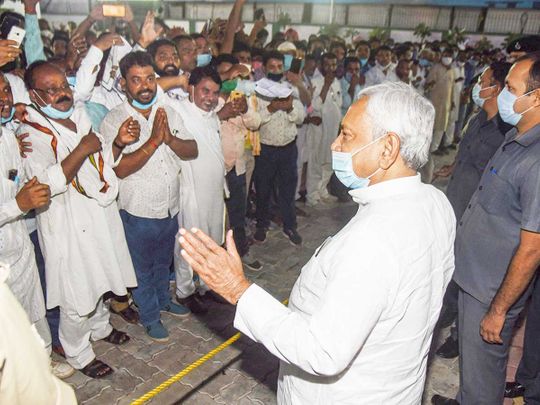
Patna: All candidates seeking election in the forthcoming Bihar polls have been asked to provide details of criminal cases pending against them, according to new guidelines by the Election Commission of India.
Under the new rules, a candidate is not only required to mention the details of cases pending against them in the nomination forms, but also publish them in local newspapers thrice before the elections. The poll panel will decide when these details will be published in local newspapers to make voters aware about the candidates. “Under the new guidelines, the candidates with criminal background will have to publish their criminal history within four days of filing the nomination forms in the newspapers circulated in their political constituency,” the state’s deputy election officer Baiju Nath Kumar Singh said.
“The same details have to be published for the second time after withdrawal of nomination forms. For the third time they will have to publish the same details in the local newspapers a day ahead of the polls,” Singh added. He said the new arrangement will clean up the electoral system.
The development comes after India’s top court in February this year ordered all political parties to publish on their websites, social media handles and in national newspapers the details of criminal cases pending against the candidates they are giving tickets to, along with the reasons that compelled them to field suspected criminals.
“It shall be mandatory for political parties (at the Central and State election level) to upload on their website detailed information regarding the individuals with pending criminal cases (including the nature of the offences, and relevant particulars such as whether charges have been framed, the concerned court, the case number, etc) who have been selected as candidates, along with the reasons for such selection, as also as to why other individuals without criminal antecedents could not be selected as candidates,” the court had said in its four-page judgement.
According to a study conducted by the ADR, the number of criminals entering Indian Parliament has registered a sharp increase since 2004. As per the report, in 2004, 24 percent of parliamentarians had criminal cases pending against them, which went up to 30 percent in 2009, 34 percent in 2014 and 43 percent in 2019.
Indian laws don’t prohibit anyone from contesting elections until he is convicted by the court and sentenced to jail for two years or more. Apparently using the particular clause, criminal-politicians have been contesting elections and getting elected to both Parliament and State assemblies. In December 2019, a dreaded Maoist Kundan Pahan, who has a total of 128 criminal cases pending against him, fought elections for an assembly seat in Jharkhand from behind bars as an Independent candidate. He lost the elections. Pahan, who once carried a reward of Rs1.5 million for his capture, is currently lodged in a jail.
Bihar, which has the largest number of lawmakers with criminal background, is the first state where the new rule will be put to test during the three-phase polling scheduled to start from October 28. According to a report of the ADR, Bihar currently has 142 (or 58 percent) lawmakers out of total 243 facing criminal charges.
Of the 142 lawmakers, 98 (or 40 percent) face serious criminal charges. They were elected to the state assembly during 2015 state elections. During 2010 state elections, the number of such lawmakers elected to the Bihar House was 141 (or 58 percent) with 85 (or 35 percent) of them facing serious criminal cases. In 2005, the number of such legislators elected to the Bihar assembly was 117 (or 50 percent) while 68 (or 29 percent) faced serious criminal cases, which indicates how the percentage of criminal-politicians has sharply increased in the past 15 years.
“The way political parties have been giving tickets to criminal-politicians to win elections is very dangerous,” said political analyst DM Diwakar, former director with the Patna-based AN Sinha Institute of Social Studies.








